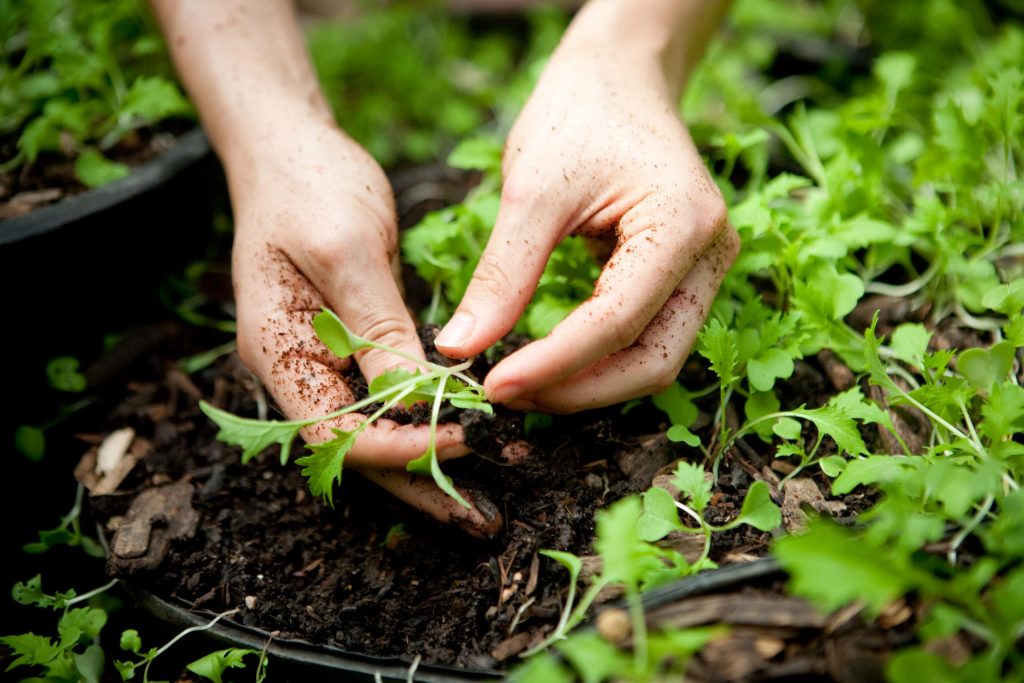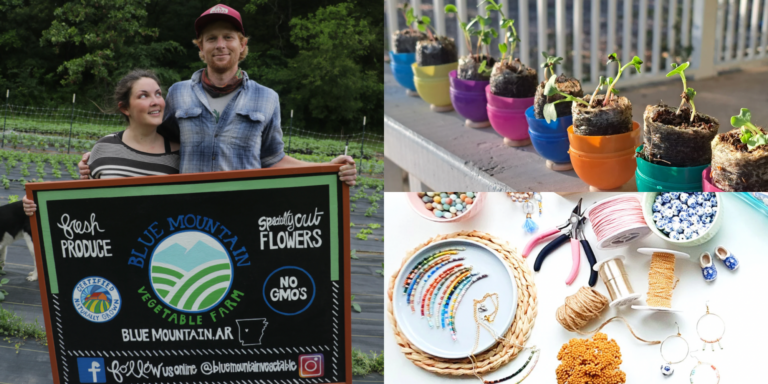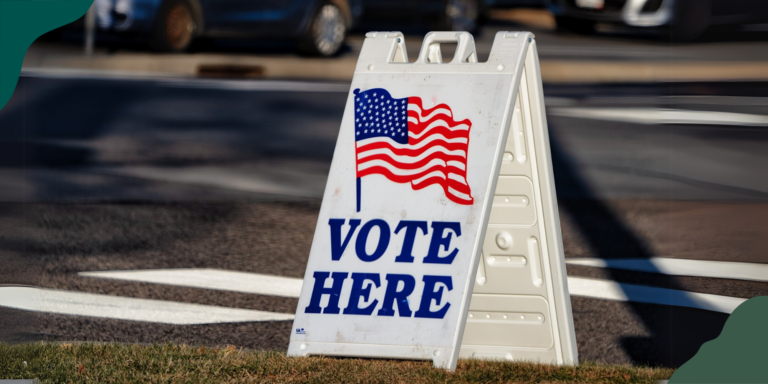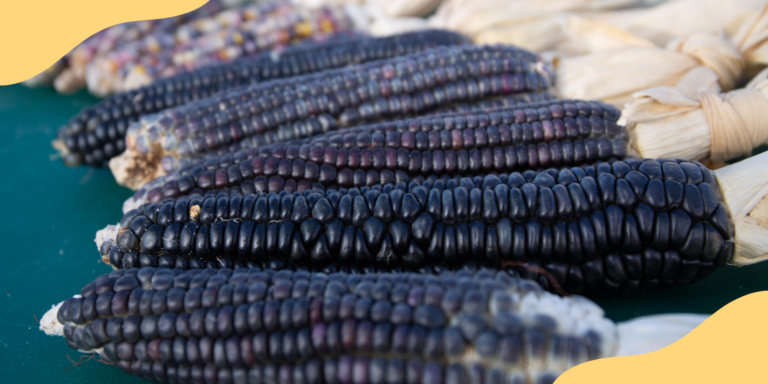Making Peace with Our Bodies at FoodCorps
“We are the people shaping kids’ relationships with food. That can’t be separated from acknowledging our own disordered eating habits.”
“We are the people shaping kids’ relationships with food. That can’t be separated from acknowledging our own disordered eating habits.”

Trigger warning: This piece discusses eating disorders and fatphobia.
When I started working at FoodCorps in 2019, I was scared. Not about learning the ins and outs of the organization, or making friends with my coworkers, or the other adjustments that come with starting a new job. I was scared of how working at FoodCorps might impact my mental health.
I’m one of the 30 million people in America who lives with an eating disorder. While my illness is mostly under control now, it’s something I’ve been dealing with in some way or another for over a decade. Some days, weeks, and even months are harder than others, but I’m privileged enough to have access to healthcare, therapy, and other tools that help me get by.
But when I joined the team at FoodCorps, I wasn’t sure what to expect. Would our focus on healthy food make me feel obsessive about my eating habits again? How supportive would the work culture be for staffers with mental illness? As a food-focused organization, would we talk about eating disorders and body image at all?
I didn’t get obvious answers to any of my questions, but in my almost three years working at FoodCorps, I’ve seen us put effort into addressing the ways our work overlaps with body image, eating disorders, and mental health. Some of that work involves making up for past harms we’ve caused. Some of it is just beginning. And I’m not the only one thinking about it.
“What drew me to working on food issues was my own personal experience with and recovery from an eating disorder,” says Alexa Arnold, FoodCorps’ Chief of Staff. “I was drawn to FoodCorps because at its core, our service members are supporting kids’ relationships with food, and I have always reflected on what it might have been like to have that positive influence at such a young age.”
A former FoodCorps service member who preferred to remain anonymous shared similar feelings.
“The reason I ended up doing food work is because of the fractured relationship I had with food throughout my life,” they said. “Having these conversations as food educators is deeply important because we are the people shaping kids’ relationships with food. That can’t be separated from acknowledging our own disordered eating habits and histories.”
This month, FoodCorps introduced “How to Make Friends With a Carrot,” a children’s book that serves as a resource for talking to kids about diversity and body positivity. It’s an exciting move that signals upcoming work for FoodCorps, where body image and eating disorder awareness are showing up more and more.
But as we grow into this space, it’s important to reflect on the ways our work overlaps with the movement for body acceptance and eating disorder awareness, on how far we’ve come, and on how far we have to go.
When FoodCorps was founded, much of the child nutrition community was preoccupied with the so-called obesity epidemic. At first, FoodCorps considered itself a part of that movement, devoting resources and airtime to ending childhood obesity.
We’ve since moved away from this framing, realizing now how it harmed so many kids and adults. (Read our inaugural Equity, Diversity, & Inclusion Report to learn more.) But we still have more to learn. After all, ending fatphobia is a matter of equity.
“Because we are a food justice organization, if we want to lean into justice, it is important to help reframe messaging that’s out there that might not be supportive of all bodies,” says Arely Garcia, FoodCorps’ Senior Manager of Equity, Diversity, and Inclusion. “If we want to reclaim ourselves, we need to explore these sides of ourselves and learn how to love ourselves again. In my experience, it feels like white supremacy culture takes that away from us.”
Fatphobia and white supremacy culture are inextricably linked. As Sabrina Strings wrote in the book Fearing the Black Body: The Racial Origins of Fatphobia, fatphobia as we know it finds its roots in racism dating back hundreds of years.
“The current anti-fat bias in the United States and in much of the West was not born in the medical field,” Strings writes. “Racial scientific literature since at least the eighteenth century has claimed that fatness was ‘savage’ and ‘black.’”
The legacy of racialized fatphobia persists today, with foods traditionally eaten by Black and Brown communities commonly perceived as “less healthy” than other foods, and Black and Brown bodies being overly policed and scrutinized. What’s more is how children and adults alike are blamed and shamed for existing in larger bodies, a stigma that often leads to disordered eating habits and poor mental health.
While media representations of eating disorders might make it seem as though white women are the only people affected, eating disorders impact people of all racial backgrounds. For example: Asian, Black, Latine, and white youth “all reported attempting to lose weight at similar rates,” according to the National Eating Disorders Association. And people of color are “significantly less likely” to get help for eating disorders, including getting support from their doctors for their symptoms.
FoodCorps has been learning from Virgie Tovar, an author and activist on weight-based discrimination, to understand how our work can better celebrate all bodies. In 2020, Tovar wrote an article for the Sociological Review titled “Why Is Our Culture Preoccupied with How BIPOC Children Eat?” Tovar writes:
“Almost all of our public health solutions for children rely on individual behaviors, like not drinking soda. Not drinking soda will not solve racism. Whether a person does or does not eat any amount of potato chips is not the key to ending structural poverty. Disproportionately relying on public health measures that target individual behaviors doesn’t appropriately address what are, in fact, structural inequalities.”
As an organization committed to racial equity, FoodCorps must acknowledge the racial implications of fatphobia — and the activists of color leading the charge to undo it.
“I think there’s a lot of white dominant culture and white supremacy baked into healthy food and what we conceive of as healthy food,” said the anonymous FoodCorps alum mentioned earlier. “We have a lot of unlearning and learning to do around what foods are healthy and nourishing.”
The alum also shared that the nature of service can make it challenging to foster a healthy relationship with food. Service members are working with students during their lunch hours, performing intense physical labor by upkeeping gardens, and in previous years, were not provided with resources about eating disorders.
“I returned back to some old disordered eating habits and behaviors and felt justified in it because of what my service schedule and structure would allow for,” they said. “My own relationship with food and eating habits suffered as I was teaching about healthy food.”
How is FoodCorps tackling body image today? We’re at the beginning of our learning journey, but making strides towards celebrating all bodies, food traditions, and forms of nourishment.
FoodCorps AmeriCorps service members teach kids about nourishing food through hands-on, experiential learning. Students might learn to make their own smoothies, taste different preparations of butternut squash, or grow their own radishes in the school garden.
But they’re also encouraged to talk about the foods they eat at home, the recipes passed along in their families, and the many people who feed them. Service members take care not to label foods as “good” or “bad,” and encourage kids to create balanced meals with the foods they already love.
Eve Jaggers, a FoodCorps service member in Georgia, says her service has encouraged her to think differently about her own relationship with food.
“Teaching kids and interacting with them in a way that encourages them to care for and be in touch with their bodies has reinforced that lesson for myself,” she says. “Hands-on service has made practicing what I preach easier.”
While FoodCorps is in the early stages of introducing weight neutrality and body positivity into lessons, nurturing healthy relationships with food has long been a goal.
“[Kids] get ideas from a lot of different sources that are still really infused with diet culture,” says Arnold. “We’re providing this alternative way of thinking that is centering kids’ trust in themselves. It’s an opportunity for them to develop a positive relationship with food beginning at a young age.”
This nuance is particularly important when helping kids unlearn what they’ve been taught about “unhealthy” foods, especially when those foods may be the only option available.
“I appreciate that FoodCorps has had these conversations about not shaming people for the food they have. Sometimes certain foods are all we can get, that’s all we can eat,” says Garcia. “Food should be accessible to everybody. We all have the right to be alive in this world, to feed ourselves from the natural resources that this beautiful land offers, so why does it become a privilege to be able to buy organic produce?”
As for staff and service members, FoodCorps is working on fostering a more supportive culture. “How to Make Friends With a Carrot” aims to open up conversations about body image between service members and the kids they work with. A new resource group convenes staff and service members to talk about eating disorders. We’re continuing to work with scholars like Virgie Tovar to educate ourselves.
“[The resource group] kind of got the ball rolling for how I started to look at my own eating disorder and how it was affecting my service,” says Jaggers. “Not talking about or avoiding conversations about body image and eating disorders is never going to make these occurrences go away. Avoiding the subject only makes these situations harder to navigate.”
Our relationships with food form early, and FoodCorps service members are positioned to make huge impacts in how kids understand the role of food in their lives. But those lessons continue to affect us even in our adulthood.
“Removing fear, removing shame is the biggest hurdle we face around eating,” said the anonymous FoodCorps alum. “That’s not just education for kids, that’s also professional development and personal development for yourself.”
As for my own journey, I’ve appreciated being surrounded by people who care deeply about food — not just for its nutritional value, but for the ways it connects us to our culture, our community, and ourselves. For so much of my life, I believed food was an enemy. Many of our service members, staff, and the kids we work with have heard similar messages all their lives. It’s part of our work to show them something different.
I still have a long way to go in healing my relationship with food — and FoodCorps has a long way to go in how we live these values. But I believe we’re both well on our way.
Need support around body image and eating disorders? Check out our blog on available resources.

9 Thoughtful Holiday Gifts Made by FoodCorps Alumni

The Policy Brief, Fall 2024: After the Election

Food as Medicine: Teaching Indigenous Foodways